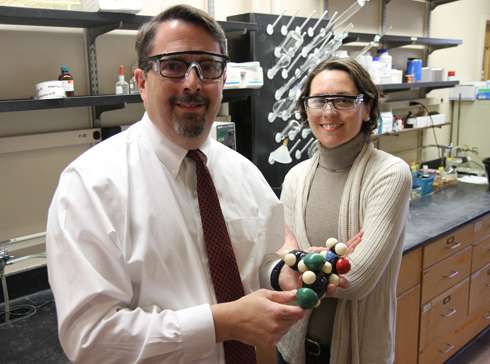Drug discovery researchers identify, refine compound to combat malaria parasite

Two Virginia Tech researchers found that when it comes to fighting malaria, teamwork pays off.
Paul Carlier, a professor of chemistry in the College of Science, and Maria Belen Cassera, an assistant professor of biochemistry in the College of Agriculture and Life Sciences, have discovered a compound that packs a mean punch to the malaria parasite Plasmodium falciparum.
Better yet, the compound can be delivered to the parasite in a way that leads to minimal side effects for the human host.
"Belen [Cassera] has been researching the unique biochemistry of the malaria parasite since she was a Ph.D. student," said Carlier. "She knew where to look to find something important, and this project is a medicinal chemist's dream. We are very optimistic that this new strategy to treat malaria could eventually contribute to global health."
The findings were published in April in Bioorganic & Medicinal Chemistry Letters.
New malaria drugs are desperately needed, because malaria parasites are gaining resistance to medications such as chloroquine and artemether. Malaria was responsible for an estimated 584,000 deaths in 2013.
"This is excellent chemistry being applied to a crucial biomedical problem," said Paul Roepe, a professor of chemistry and a professor of biochemistry and cellular and molecular biology at Georgetown University, who was not involved in the research. "The need for new antimalarial drugs is dire, and the work by Carlier and Cassera provides both attractive lead compounds for drug development as well as important probes for dissecting a key antimalarial drug target, the non-mevalonate pathway for isoprenoid biosynthesis. This pathway does not exist in humans, making it an extremely attractive, specific target for antimalarial drug design."
Carlier and Cassera are now focused on developing related compounds that will be effective against both the major African malaria parasite Plasmodium falciparum, as well as Plasmodium vivax, a major vector of malaria in South America and Asia.
Relapse is a particular problem in treating Plasmodium vivax malaria, and an ideal malaria drug would prevent relapse by killing dormant parasites in asymptomatic patients.
Carlier and Cassera have applied for funding to continue this work.
"Without Paul Carlier's collaboration we would not be able to move this project to the next step," Cassera said. "Each of us brings a different but complementary knowledge of drug discovery that fuels our minds and determination to turn ideas into reality."
More information: "Determination of the active stereoisomer of the MEP pathway-targeting antimalarial agent MMV008138, and initial structure–activity studies," Bioorganic & Medicinal Chemistry Letters, Volume 25, Issue 7, 1 April 2015, Pages 1515-1519, ISSN 0960-894X, dx.doi.org/10.1016/j.bmcl.2015.02.020
Provided by Virginia Tech

















